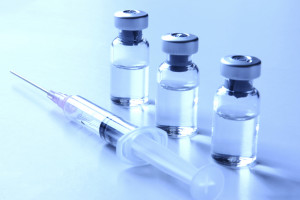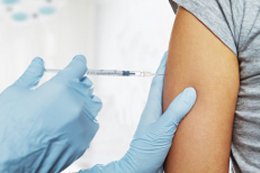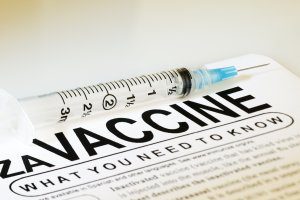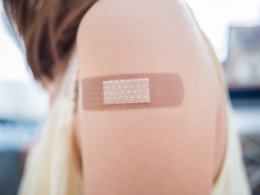 The measles, mumps and rubella (MMR) vaccine has recently been in the news as a result of reports of measles outbreaks in several parts of the country. According to the Centers for Disease Control and Prevention (CDC), outbreaks have been reported in California, Illinois, New York, Texas and Washington, with more cases of measles already confirmed in 2019 (269 as of March 14) than all of 2016 and 2017 combined (206).
The measles, mumps and rubella (MMR) vaccine has recently been in the news as a result of reports of measles outbreaks in several parts of the country. According to the Centers for Disease Control and Prevention (CDC), outbreaks have been reported in California, Illinois, New York, Texas and Washington, with more cases of measles already confirmed in 2019 (269 as of March 14) than all of 2016 and 2017 combined (206).
While the CDC recommends vaccination against measles, mumps and rubella for most individuals (with limited exceptions for pregnant women and individuals with certain other health conditions), “[d]uring an outbreak is when you see an influx of patients who would otherwise be vaccine-hesitant,” according to an infection control nurse in Washington quoted by CNN. Unfortunately, although getting the MMR vaccine can significantly reduce an individual’s risk of contracting measles, it carries certain risks as well. Continue reading →
 While getting vaccinated against influenza is important for everyone, the flu shot can have particular benefits for individuals with certain health conditions. As an infectious disease specialist recently told NPR:
While getting vaccinated against influenza is important for everyone, the flu shot can have particular benefits for individuals with certain health conditions. As an infectious disease specialist recently told NPR:
 According to
According to  The 2019-2020 flu season is here. Each flu season, well over 100 million Americans get vaccinated, and the Centers for Disease Control and Prevention (CDC)
The 2019-2020 flu season is here. Each flu season, well over 100 million Americans get vaccinated, and the Centers for Disease Control and Prevention (CDC)  If you have been diagnosed with Shoulder Injury Related to Vaccine Administration (SIRVA), Guillain-Barre Syndrome (GBS), or another vaccine-related injury or illness, understanding the steps to take following your diagnosis will be critical to your health and your financial stability. The treatment options for certain types of vaccine-related injuries and illnesses are limited; and, in order to recover as quickly and fully as possible, you need to make sure you receive appropriate treatment and avoid mistakes that could have negative long-term consequences.
If you have been diagnosed with Shoulder Injury Related to Vaccine Administration (SIRVA), Guillain-Barre Syndrome (GBS), or another vaccine-related injury or illness, understanding the steps to take following your diagnosis will be critical to your health and your financial stability. The treatment options for certain types of vaccine-related injuries and illnesses are limited; and, in order to recover as quickly and fully as possible, you need to make sure you receive appropriate treatment and avoid mistakes that could have negative long-term consequences. When you get a flu shot or other vaccination, it is normal to experience mild pain at the injection site. But, what if your pain lingers? What if it gets worse over time? What if you start to experience other effects, such as reduced strength or limited mobility in your shoulder? These are all possible symptoms of a class of injuries known as “shoulder injury related to vaccine administration,” or “SIRVA.”
When you get a flu shot or other vaccination, it is normal to experience mild pain at the injection site. But, what if your pain lingers? What if it gets worse over time? What if you start to experience other effects, such as reduced strength or limited mobility in your shoulder? These are all possible symptoms of a class of injuries known as “shoulder injury related to vaccine administration,” or “SIRVA.” If you have been diagnosed with a vaccine-related injury, including a Shoulder Injury Related to Vaccine Administration (SIRVA), you may be entitled to recover your medical expenses and certain other losses under the National Vaccine Injury Compensation Program (VICP). Here are 10 key facts about filing a claim under the VICP:
If you have been diagnosed with a vaccine-related injury, including a Shoulder Injury Related to Vaccine Administration (SIRVA), you may be entitled to recover your medical expenses and certain other losses under the National Vaccine Injury Compensation Program (VICP). Here are 10 key facts about filing a claim under the VICP: Shoulder Injury Related to Vaccine Administration (SIRVA) can take a variety of forms, each with its own effects and long-term prognosis. While most people diagnosed with SIRVA will eventually recover, recovery options vary, and a person’s individual health profile can have a significant impact on the challenges, costs and duration of the recovery process.
Shoulder Injury Related to Vaccine Administration (SIRVA) can take a variety of forms, each with its own effects and long-term prognosis. While most people diagnosed with SIRVA will eventually recover, recovery options vary, and a person’s individual health profile can have a significant impact on the challenges, costs and duration of the recovery process. While receiving vaccinations is a safe and effective means for combatting disease, there are certain diseases and medical conditions that can increase an individual’s risk of an adverse reaction or other negative side effects. The Centers for Disease Control and Prevention (CDC) refer to these as “contraindications” and “precautions,” and it
While receiving vaccinations is a safe and effective means for combatting disease, there are certain diseases and medical conditions that can increase an individual’s risk of an adverse reaction or other negative side effects. The Centers for Disease Control and Prevention (CDC) refer to these as “contraindications” and “precautions,” and it  With vaccine injections, it is normal to experience acute stinging or dull pain that dissipates in the hours following the vaccination. It is not normal for this pain to linger, worsen or spread to other parts of the arm or shoulder. Unfortunately, while this pain is not normal, studies show that it is becoming
With vaccine injections, it is normal to experience acute stinging or dull pain that dissipates in the hours following the vaccination. It is not normal for this pain to linger, worsen or spread to other parts of the arm or shoulder. Unfortunately, while this pain is not normal, studies show that it is becoming